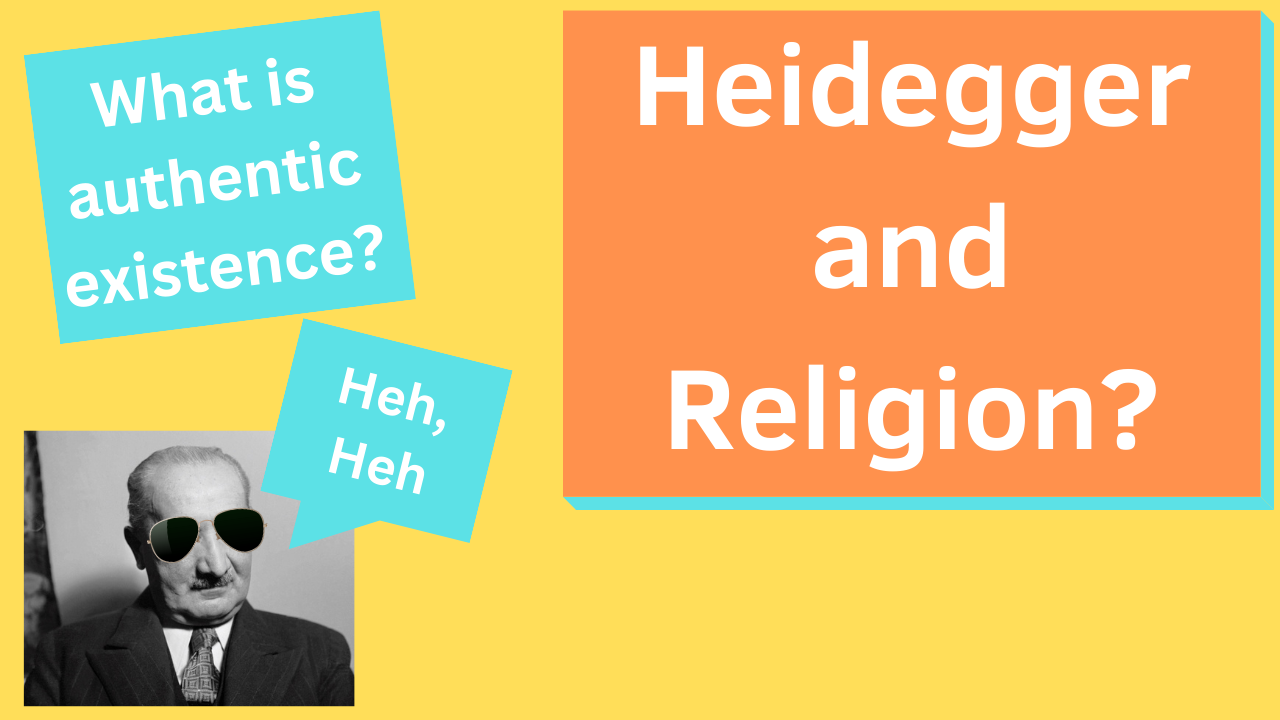03/13/2024 – Heidegger and Religion?

Why is Heidegger so important for understanding religion? Let’s find out. This is 10 on Religion. Boom.
Hey peeps, it’s Dr. B. with TenOnReligion. If you like religion and philosophy content one thing I really need you to do is to smash that sub button because it really helps out the channel. The transcripts are available at TenOnReligion.com and new episodes are posted about every two weeks, around noon, U.S. Pacific time, so drop me some views. Are you ready for this, dudes and dudettes?
Okay, from Heidegger we get important advancements in both existentialism and hermeneutics. This is why he is so important for understanding religion. I’ve already talked about Heidegger and the hermeneutical circle in a few other recent episodes so today let’s talk about the existentialism part. Existentialism simply means that the fact that we exist comes first and then we make meaning out of our existence. The thought of Martin Heidegger is initially influenced by the thought of his teacher, Husserl, but then expands rather exponentially in another direction. Let’s get started.
For Heidegger, a person not only has a mind but also is a “self” in a “world.” This “self” in a “world” is also understood in terms of temporality, or time, which Heidegger terms with the German word Dasein. Dasein refers to the general idea of being, or existence, in a world which is perpetuated through time. Now, the trouble in trying to understand Heidegger’s main writing, Being and Time, is that he uses regular German words in very different ways from their original meaning. When he can’t find a word in German to say what he wants it to say, he invents a new word. So, it can get a little confusing. Or a lot confusing. But the main word to keep in mind is “being,” or Dasein, often written in English as “being-in-the-world.”
Heidegger thought that much of the history of philosophy has been a forgetting of “being” since it has focused on the ontical, rather than the ontological. This is a really critical distinction for both philosophy and religion. Ontical refers to beings which cannot really think about their own existence vs. ontological which refers to creatures which can think about their own being. Typically, we do not exist to be observed and be reduced to objects. This is what he calls the ontical and it is how we treat most other scientific or social-scientific aspects of our experience such as psychological, physical, biological, socio-political, economical, and so forth. Rather than being objects in the world, we are living and existing in the world. Dasein is the space around us through time which signifies an array of possibilities which can be realized in time. Heidegger interprets this temporally in terms of finitude and care. Since we’re finite rather than infinite beings, we care about our existence. Sounds religious already, right? For Heidegger, the ontical and reductive accounts mentioned above do not capture what is distinctly ontological. The ontological is the study of “being-itself” when it is not reduced to an object. The idea that we’re finite and not infinite beings coupled with the fact that we care about our existence is hugely important for many religious thinkers, especially figures like Paul Tillich, or more recently, Robert Neville. Let’s take this a step further.
The two modes of Dasein in Heideggerian thought are inauthentic, or “being-in-the-world,” and authentic, or “being-towards-death.” The first mode, “being-in-the-world,” is not about spatial designations of being inside something, but rather familiarity and comfortability with something. This comfortability of feeling at home in the world is the typical and ordinary way we go about our daily lives. This is how we spend much of our time. We are absorbed in our regular routines as inauthentic Dasein and we care about these typical, everyday things. The clothes and makeup we wear, what cars we drive, the shows we watch and music we listen to. We have lost sight of our finitude. Nothing is really surprising, individual, or special about us because every thought is also already going on in someone else’s head. Within any given time or place we all have similar experiences. Heidegger wrote that “being-with” means Dasein is disclosing the “Dasein-with” of others which belongs to it. We’re all part of the same show. We’re all in the same boat. Dasein’s “being” is “being-with.” The understanding of others is already implied.
Heidegger shows that much of the past history of philosophy views objects and entities ontically as things. We have forgotten “being” because we have disregarded what is, at its most fundamental level, ontological. Now you might ask, what’s wrong with ontical understandings? Aren’t we also objects too? These questions take us back to the two intimately linked ideas of finitude and care. Since we are usually absorbed with typical and ordinary things, we are always running out of time being fully engaged with many unimportant time-consuming activities. We have lost sight of our finitude, and it is because of our finitude that we care. Which is more important to you – making sure your latest streaming app works or eating a meal and sharing your life with one of your best friends? We waste a lot of time.
Okay, this next part might hurt a little bit. Shortly after describing these aspects of care in Being and Time, Heidegger introduces his concept of “the they” which is in the German neuter case, so there’s no exact English-language equivalent. “The they” are norms that govern conventions, including morals, which we are born into and did not choose, thus they are inherited from people in our society who came before us. We compare ourselves, in relation to a baseline normality in society. But if one deviates too much, one has to come back into conformity and will be levelled down. Or, occasionally we rationalize our actions using “the they” to excuse oneself (…but everyone does it…). “The they” represents a controlling factor as Heidegger writes about “the they” as functioning as a real dictatorship over one’s behavior. The dictatorship of “the they” is constantly policing to keep one in average everydayness. This explains why we are inauthentic. We lose ourselves living on autopilot, in smooth non-questioning and non-doubting daily routines in reference to everyone else around us in society.
To take this yet a step further, Heidegger mentions anxiety. Anxiety points to one’s authentic self and causes one to flee. What is one fleeing? Anxiety. We have moments when we realize we are inauthentic but don’t quite know how to deal with that realization. This anxiety individualizes Dasein. Anxiety is anxious in the face of our existence, or “being-in-the-world.” Being anxious amounts to feeling like we’re in an unfamiliar space or not feeling at home. This is why the tendency is so great to flee towards the familiar, everyday ordinary things like makeup, clothes, and TikTok because it turns us away from something which for most of us is unbearable. Basically, facing the end of our existence.
You see, for Heidegger, death represents the possibility of the impossibility of Dasein – no more “being-in-the-world.” However, since there is no totality until death, we can never fully experience our totality. Only those close to us can do that after our death because while we are alive there is always more “being” added to the story. So, what is authentic Dasein? It’s an ontologically adequate conception of death which is an existential conception and that’s where religion often comes into the picture. Heidegger said “being-towards-death” is the authentic self, partially projected beyond the end point. That’s deep.
So, let’s sum this up. The main crux of Heidegger’s thought is the transition from the ontical to the ontological. We live in the world as temporal Dasein, not primarily as some category of objects to be studied and investigated by the various sciences. Because of finitude and care, the ontical reductive accounts by science and other disciplines do not fully encapsulate what is ultimately ontological about us. But because we have moments when we realize we are finite, we are constantly fleeing anxiety in the face of this finitude. We are simultaneously living as both inauthentic and authentic lives. We only accomplish fragments of what we want to in our lifetimes and we have to learn how to live with those fragments.
So, what do you think about why Heidegger is so important to understanding religion? I tried to provide a more easy-to-understand version of his existentialism. I hope it worked. Let me know what you think. Until next time, stay curious. If you enjoyed this, please like and share this video and subscribe to this channel. This is 10 on Religion.


